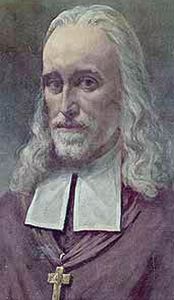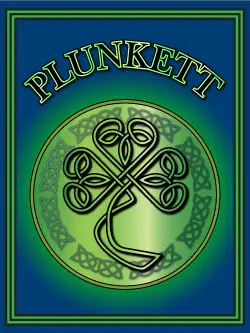The name Plunkett is commonly found in America, Canada, Australia and Britain.
In most cases, these countries got the name from Irish settlers, mainly in the mid-to-late-1800s when a million people left Ireland to escape starvation after the ‘Great Famine’.
The name arrived in Ireland in the late 12th and early 13th centuries. Plunkett comes from the Norman name ‘Blanchet’, meaning white. The Normans successfully invaded England in the 11th century and it didn’t take them long to turn their attention to Ireland.
They first invaded in 1167 when Henry II granted permission for Dermot MacMurrough to recruit Norman soldiers. He wanted help in regaining his position as King of Leinster after he had been ousted by Rory O’Connor.
The Normans helped MacMurrough but settled in Ireland themselves, sparking Henry II to send his own army across to maintain control of the country.
This sequence of events resulted in thousands of Norman soldiers invading and settling in Ireland. Many formed alliances with Irish clan leaders, and integrated themselves into the Irish societies.
The Norman name ‘Blanchet’ was adapted to the Irish version Plunkett. Ever since it has been considered a typical Irish name. Most Plunketts initially stayed in the east of the country, particularly around Counties Meath and Dublin.
When the British invaded again in the 17th century, they took total control of Ireland. Records of people’s names were taken so that they could be taxed efficiently.

English officials would write down the names as they sounded to them. This was obviously open to interpretation by each individual so many Irish names had variations emerge at this point.
The name Plunkett was also recorded as Plunket, Plunkit and Plonket as well as several other versions.
Famous Plunketts of Ireland
There have been many notable people called Plunkett in the history of Ireland.
Oliver Plunkett was a Catholic bishop in Ireland in the 17th century. He was forced into hiding after the Cromwellian invasion led to the destruction of the Catholic Church and the execution of many of its officials.
After a few years, Plunkett returned and began rebuilding the Church with schools and monasteries.
He was falsely accused of planning a French invasion of Ireland. The accusation was a ploy by Arthur Capell, the first Earl of Essex, who wished to regain his previous position as Lord Lieutenant of Ireland.
Plunkett’s case was intended to undermine the present Lieutenant, which it did, but it also resulted in Plunkett being hanged for treason. The case is widely regarded as a farce and an embarrassment to the history of British Justice.
Joseph Plunkett was a leader of the Easter Rising Rebellion of 1916. Hundreds of Irish nationalists seized several key buildings in Dublin and declared Ireland an independent republic.
It took the British Army five days to regain control of the city. Joseph Plunkett was arrested as one of the leaders of the Rising. He was sentenced to death by firing squad.
Plunkett married his sweetheart Grace Gifford in Kilmainham Gaol just a few hours before his execution. The Easter Rising is one of the most significant events in the history of Ireland’s fight for independence.
James Plunkett was an Irish writer who grew up in Dublin in the years after the Easter Rising and during the Irish War of Independence and the Irish Civil War.
Much of his work was influenced by his experiences of seeing working-class Irish people struggle for a better life.
His most famous work is the novel, Strumpet City, which is based on the Dublin Lockout worker’s strike of 1913. Plunkett is also famous for his radio play Big Jim, about the Irish trade unionist James Larkin.
Worldwide Plunketts
Roy J. Plunkett was a chemist from Ohio. In 1938 he made a chance discovery of a heat-proof, low friction substance that was immune to rusting.
The substance is called polytetrafluoroethylene. It was quickly patented and branded as Teflon, and is now used in kitchens all over the world.

Jim Plunkett was an American Football player who had a long and successful career for the New England Patriots, San Francisco 49ers and Oakland/L.A. Raiders. He won the Super Bowl in 1981 and 1984 and was named the MVP in the 1981 final.
Liam Plunkett is a professional cricketer from England. He is regarded as one of the top right-arm fast bowlers in the domestic game and has also represented his country in both Test Match and One Day International formats of the game.
